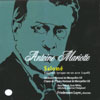Mariotte Salomé
A bit of a Wilde card but Strauss wins the Salome stakes by more than a head
View record and artist detailsRecord and Artist Details
Composer or Director: Antoine Mariotte
Genre:
Opera
Label: Accord
Magazine Review Date: 4/2007
Media Format: CD or Download
Media Runtime: 159
Mastering:
Stereo
DDD
Catalogue Number: 442 8553

Tracks:
| Composition | Artist Credit |
|---|---|
| Salomé |
Antoine Mariotte, Composer
Antoine Mariotte, Composer Cyril Rovery, Premier Soldat, Baritone Delphine Galou, Page d' Hérodias, Mezzo soprano Fabrice Mantegna, Second Soldat, Tenor Friedemann Layer, Conductor Jean-Luc Chaignaud, Iokanaan, Baritone Julia Juon, Herodias, Mezzo soprano Kate Aldrich, Salome, Mezzo soprano Marcel Reijans, Jeune Syrien, Tenor Montpellier Languedoc-Roussillon National Orchestra Montpellier Opera Chorus Scott Wilde, Hérode, Bass |
Author: Arnold Whittall
Here’s a Class A curiosity. Antoine Mariotte (1875-1944) set the original French text of Oscar Wilde’s play before Richard Strauss composed his German version. But it was Strauss who had official permission to turn the play into an opera, and Mariotte’s version wasn’t performed until 1908, three years after Strauss’s success.
Comparisons are telling. Love it or loathe it, Strauss’s Salome is a work of genius, with the artistic daring to craft a climax portraying Salome’s fanaticism as even purer and more potent than Jokanaan’s. Mariotte was a pupil of Vincent d’Indy, and there is little of either conviction or vulgarity in his music. It flows along, rather stodgily, in a generalised late-romantic idiom. The “Dance of the Seven Veils” is signally unballetic, and the only moderately hair-raising moment occurs when, as the stage directions require, “a large black arm comes out of the cistern, bearing the head of Jokanaan on a silver charger”.
This was Mariotte’s first opera and there are many signs of inexperience. The vocal writing never distinguishes sufficiently between things needing emphasis – like Jokanaan’s curse – and less focal narrative episodes. It is an obvious mistake to make both Jokanaan and Herod bass-baritones: they really do sound rather alike. The orchestration is efficient in its weighty way, but needs sharper contrasts to bring such a subject to life. All in all, it’s easy to conclude that, even if Strauss’s opera did not exist, Mariotte’s would never have caught on. But I enjoyed hearing it, thanks to a no-holds-barred performance by Friedemann Layer’s redoubtable Montpellier team. All the principals are persuasive, especially Kate Aldrich and Julia Juon, well differentiated as Salome and Herodias. Marcel Reijans scores as the “Jeune Syrien” – Narraboth – and both Jean-Luc Chaignaud and Scott Wilde deploy their mature voices to appropriately melodramatic effect.
A more forward balance for the voices might have helped to make the recording seem less thickly-textured, and the booklet makes its own contribution to the overall surrealism by giving the tracks on Disc 2 exactly the same durations as those on Disc 1. Warts and all, this is a fascinating release: but it’s Strauss who emerges with his reputation enhanced.
Comparisons are telling. Love it or loathe it, Strauss’s Salome is a work of genius, with the artistic daring to craft a climax portraying Salome’s fanaticism as even purer and more potent than Jokanaan’s. Mariotte was a pupil of Vincent d’Indy, and there is little of either conviction or vulgarity in his music. It flows along, rather stodgily, in a generalised late-romantic idiom. The “Dance of the Seven Veils” is signally unballetic, and the only moderately hair-raising moment occurs when, as the stage directions require, “a large black arm comes out of the cistern, bearing the head of Jokanaan on a silver charger”.
This was Mariotte’s first opera and there are many signs of inexperience. The vocal writing never distinguishes sufficiently between things needing emphasis – like Jokanaan’s curse – and less focal narrative episodes. It is an obvious mistake to make both Jokanaan and Herod bass-baritones: they really do sound rather alike. The orchestration is efficient in its weighty way, but needs sharper contrasts to bring such a subject to life. All in all, it’s easy to conclude that, even if Strauss’s opera did not exist, Mariotte’s would never have caught on. But I enjoyed hearing it, thanks to a no-holds-barred performance by Friedemann Layer’s redoubtable Montpellier team. All the principals are persuasive, especially Kate Aldrich and Julia Juon, well differentiated as Salome and Herodias. Marcel Reijans scores as the “Jeune Syrien” – Narraboth – and both Jean-Luc Chaignaud and Scott Wilde deploy their mature voices to appropriately melodramatic effect.
A more forward balance for the voices might have helped to make the recording seem less thickly-textured, and the booklet makes its own contribution to the overall surrealism by giving the tracks on Disc 2 exactly the same durations as those on Disc 1. Warts and all, this is a fascinating release: but it’s Strauss who emerges with his reputation enhanced.
Discover the world's largest classical music catalogue with Presto Music.

Gramophone Digital Club
- Digital Edition
- Digital Archive
- Reviews Database
- Full website access
From £8.75 / month
Subscribe
Gramophone Full Club
- Print Edition
- Digital Edition
- Digital Archive
- Reviews Database
- Full website access
From £11.00 / month
Subscribe
If you are a library, university or other organisation that would be interested in an institutional subscription to Gramophone please click here for further information.




